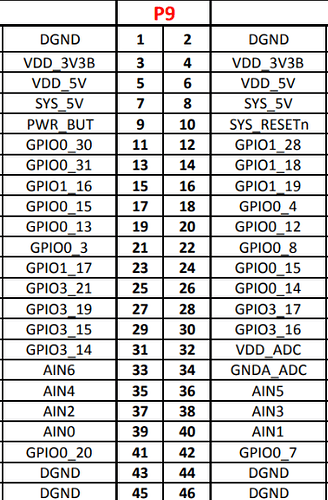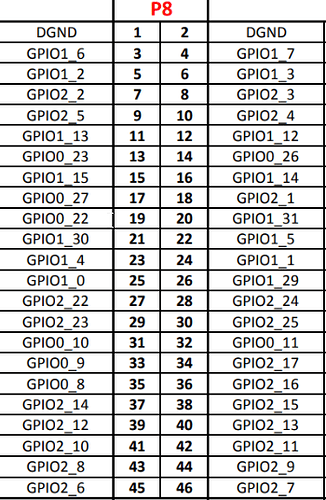Hello everyone, i saw the declaration of GPIO changed from kernel 4 to kernel 6, for example , here is what cat /sys/kernel/debug/gpio returns me from differents kernels
Kernel 4
root@BB:~# cat /sys/kernel/debug/gpio
GPIOs 0-31, platform/44e07000.gpio, gpio:
gpio-6 ( |cd ) in lo IRQ
gpio-22 ( |sysfs ) in lo
gpio-23 ( |sysfs ) in hiGPIOs 32-63, platform/4804c000.gpio, gpio:
gpio-34 ( |sysfs ) in hi
gpio-35 ( |spi-gpio-reset ) out hi
gpio-36 ( |sysfs ) in hi
gpio-44 ( |sysfs ) in hi
gpio-45 ( |sysfs ) in hi
gpio-48 ( |omap-serial-rts ) out lo
gpio-50 ( |omap-serial-cts ) out lo
gpio-51 ( |omap-serial-cts ) out lo
gpio-53 ( |? ) out lo
gpio-54 ( |? ) out lo
gpio-55 ( |? ) out hi
gpio-56 ( |? ) out lo
gpio-59 ( |clk_mcasp0 ) out lo
gpio-60 ( |omap-serial-rts ) out lo
gpio-61 ( |sysfs ) in hi
gpio-62 ( |sysfs ) in loGPIOs 64-95, platform/481ac000.gpio, gpio:
gpio-67 ( |watchdog ) out hiGPIOs 96-127, platform/481ae000.gpio, gpio:
gpio-114 ( |sysfs ) in hi
gpio-115 ( |omap-serial-rts ) out loGPIOs 508-511, spi/spi2.1, spi2.1, can sleep:
gpio-508 ( |sysfs ) out lo
gpio-509 ( |sysfs ) out lo
gpio-510 ( |sysfs ) out lo
gpio-511 ( |sysfs ) out hi
Kernel 6, with no gpio binded, lost all my leds and my gpio extension :
root@BB:~# cat /sys/kernel/debug/gpio
gpiochip0: GPIOs 512-543, parent: platform/4804c000.gpio, gpio-0-31:
gpio-512 (P8_25 [mmc1_dat0] )
gpio-513 ([mmc1_dat1] )
gpio-514 (P8_5 [mmc1_dat2] )
gpio-515 (P8_6 [mmc1_dat3] )
gpio-516 (P8_23 [mmc1_dat4] )
gpio-517 (P8_22 [mmc1_dat5] )
gpio-518 (P8_3 [mmc1_dat6] )
gpio-519 (P8_4 [mmc1_dat7] )
gpio-520 (NC |PHY reset ) out hi ACTIVE LOW
gpio-521 (NC )
gpio-522 (NC )
gpio-523 (NC )
gpio-524 (P8_12 )
gpio-525 (P8_11 )
gpio-526 (P8_16 )
gpio-527 (P8_15 )
gpio-528 (P9_15A )
gpio-529 (P9_23 )
gpio-530 (P9_14 [ehrpwm1a] )
gpio-531 (P9_16 [ehrpwm1b] )
gpio-532 ([emmc rst] )
gpio-533 ([usr0 led] |beaglebone:green:usr) out lo
gpio-534 ([usr1 led] |beaglebone:green:usr) out lo
gpio-535 ([usr2 led] |beaglebone:green:usr) out hi
gpio-536 ([usr3 led] |beaglebone:green:usr) out lo
gpio-537 ([hdmi irq] )
gpio-538 ([usb vbus oc] )
gpio-539 ([hdmi audio] |enable ) out lo
gpio-540 (P9_12 )
gpio-541 (P8_26 )
gpio-542 (P8_21 [emmc] )
gpio-543 (P8_20 [emmc] )gpiochip1: GPIOs 544-575, parent: platform/481ac000.gpio, gpio-32-63:
gpio-544 (P9_15B )
gpio-545 (P8_18 )
gpio-546 (P8_7 )
gpio-547 (P8_8 |watchdog ) out lo ACTIVE LOW
gpio-548 (P8_10 )
gpio-549 (P8_9 )
gpio-550 (P8_45 [hdmi] )
gpio-551 (P8_46 [hdmi] )
gpio-552 (P8_43 [hdmi] )
gpio-553 (P8_44 [hdmi] )
gpio-554 (P8_41 [hdmi] )
gpio-555 (P8_42 [hdmi] )
gpio-556 (P8_39 [hdmi] )
gpio-557 (P8_40 [hdmi] )
gpio-558 (P8_37 [hdmi] )
gpio-559 (P8_38 [hdmi] )
gpio-560 (P8_36 [hdmi] )
gpio-561 (P8_34 [hdmi] )
gpio-562 ([rmii1_rxd3] )
gpio-563 ([rmii1_rxd2] )
gpio-564 ([rmii1_rxd1] )
gpio-565 ([rmii1_rxd0] )
gpio-566 (P8_27 [hdmi] )
gpio-567 (P8_29 [hdmi] )
gpio-568 (P8_28 [hdmi] )
gpio-569 (P8_30 [hdmi] )
gpio-570 ([mmc0_dat3] )
gpio-571 ([mmc0_dat2] )
gpio-572 ([mmc0_dat1] )
gpio-573 ([mmc0_dat0] )
gpio-574 ([mmc0_clk] )
gpio-575 ([mmc0_cmd] )gpiochip2: GPIOs 576-607, parent: platform/481ae000.gpio, gpio-64-95:
gpio-576 ([mii col] )
gpio-577 ([mii crs] )
gpio-578 ([mii rx err] )
gpio-579 ([mii tx en] )
gpio-580 ([mii rx dv] )
gpio-581 ([i2c0 sda] )
gpio-582 ([i2c0 scl] )
gpio-583 ([jtag emu0] )
gpio-584 ([jtag emu1] )
gpio-585 ([mii tx clk] )
gpio-586 ([mii rx clk] )
gpio-587 (NC )
gpio-588 (NC )
gpio-589 ([usb vbus en] )
gpio-590 (P9_31 [spi1_sclk] )
gpio-591 (P9_29 [spi1_d0] )
gpio-592 (P9_30 [spi1_d1] )
gpio-593 (P9_28 [spi1_cs0] )
gpio-594 (P9_42B [ecappwm0] )
gpio-595 (P9_27 )
gpio-596 (P9_41A )
gpio-597 (P9_25 )
gpio-598 (NC )
gpio-599 (NC )
gpio-600 (NC )
gpio-601 (NC )
gpio-602 (NC )
gpio-603 (NC )
gpio-604 (NC )
gpio-605 (NC )
gpio-606 (NC )
gpio-607 (NC )
gpiochip3: GPIOs 608-639, parent: platform/44e07000.gpio, gpio-96-127:
gpio-608 ([mdio_data] )
gpio-609 ([mdio_clk] )
gpio-610 (P9_22 [spi0_sclk] )
gpio-611 (P9_21 [spi0_d0] )
gpio-612 (P9_18 [spi0_d1] )
gpio-613 (P9_17 [spi0_cs0] )
gpio-614 ([mmc0_cd] |cd ) in lo IRQ ACTIVE LOW
gpio-615 (P9_42A [ecappwm0] )
gpio-616 (P8_35 [lcd d12] )
gpio-617 (P8_33 [lcd d13] )
gpio-618 (P8_31 [lcd d14] )
gpio-619 (P8_32 [lcd d15] )
gpio-620 (P9_20 [i2c2_sda] )
gpio-621 (P9_19 [i2c2_scl] )
gpio-622 (P9_26 [uart1_rxd] )
gpio-623 (P9_24 [uart1_txd] )
gpio-624 ([rmii1_txd3] )
gpio-625 ([rmii1_txd2] )
gpio-626 ([usb0_drvvbus] )
gpio-627 ([hdmi cec] )
gpio-628 (P9_41B )
gpio-629 ([rmii1_txd1] )
gpio-630 (P8_19 [ehrpwm2a] )
gpio-631 (P8_13 [ehrpwm2b] )
gpio-632 (NC )
gpio-633 (NC )
gpio-634 (P8_14 )
gpio-635 (P8_17 )
gpio-636 ([rmii1_txd0] )
gpio-637 ([rmii1_refclk] )
gpio-638 (P9_11 [uart4_rxd] )
gpio-639 (P9_13 [uart4_txd] )gpiochip4: GPIOs 640-647, parent: spi/spi1.1, spi1.1, can sleep:
gpio-640 (Led9 )
gpio-641 (Led10 )
gpio-642 (Led11 )
gpio-643 (Led12 )
how should i proceed to make my gpio works and bind them, because at the moment i lost my gpio by upgrading the kernel, can anyone explain me ? i can’t find good explanation on the internet, thanks everyone

